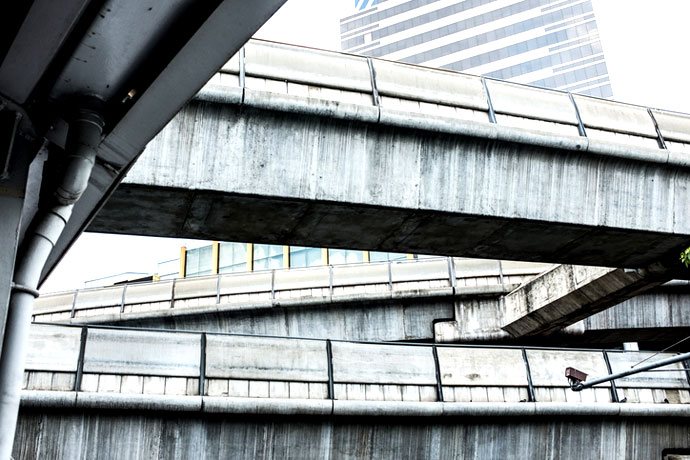
Why are police forces removing benches, shrubbery and cycle lanes in a bid to reduce crime?
In Ashford, Police recently uprooted benches and shrubbery as part of a trial to ‘prevent antisocial behaviour in hotspot areas’ – part of a draconian trend that’s seeing police influence the design of public spaces and architecture.
Elsewhere, Lib Dem councillor Ruth Fletcher has raised concerns about how cycle lanes were removed from a proposed housing development after police objected to them. The Guardian spoke to Pippa Goldfinger, of Bristol-based Design West, who told the newspaper that “police officers in Frome insisted a passcode-operated gate be installed outside some sheltered housing. The elderly residents were unable to remember the passcode and found the gate too heavy to push, becoming locked out of their homes.”
Secured by Design is a legacy of the Thatcher government. The programme encourages local police to publish neighbourhood design guides with recommendations such forgoing benches in favour of ‘single seats or stools set several metres apart’ or ‘providing too many’ footpaths. Police officers can use these guidelines (which are not legal requirements or subject to consultation) to object to planning applications.
Hostile architecture
Hostile architecture has become a global phenomenon. Here in Britain, there’s a company selling the Mosquito, a device designed to emit an unbearably high-pitched sound only kids can hear.
According to the website, the device is aimed at people ‘fed up with groups of kids damaging their property, hanging around in rowdy groups, littering, smoking and drinking, playing music and generally prevented from enjoying their home or business.’
“The Mosquito device is the only product on the market that has the teeth to bite back at these kids. The Mosquito alarm works not by being loud and painful, but by being UNBELIEVABLY annoying to the point where the kids CANNOT stay in the area being covered by the mosquito sound.”
Britain’s first children’s commissioner, Sir Al Aynsley-Green, described the device as “an ultrasonic weapon designed to stop kids gathering,” before adding that Britain was “one of the most child unfriendly countries in the world.” The Mosquito is symptomatic of cities evolving to leave behind the most vulnerable.
We treat kids like pests, but the real plague is our refusal to design cities in favour of people. Today’s increasingly homogenised urban areas favour cars and commerce over kids. Even pedestrianised areas are devoid of the public seating, loos and trees that encourage people to stop, talk and play. Pedestrianised areas are more likely to be windy corridors designed to corral shoppers to towards their next purchase.

It’s of vital importance because by 2050, around 70 per cent of people will be city dwellers. And the majority of them will be under 18. Today, over one billion children are growing up in cities.
Creating a city that nurtures children instead of literally treating them like a pest is about more than provision of places to gather. The air pollution and road danger caused by motorised traffic has a disproportionate effect on children. Furthermore, transport is now responsible for more greenhouse gas emissions than any other source in the UK; our children will reap the effects of climate change to a greater extent than previous generations.
Whether it’s hostile town planning making streets a misery for cyclists or pedestrians confronted by police-sanctioned town planning and medieval-style defensive architecture, with so many of us destined to spend our lives in the cities of the future, it’s time to put people first.
The ethical choice
The ETA was established in 1990 as an ethical provider of green, reliable travel services. Over 30 years on, we continue to offer cycle insurance, breakdown cover and mobility scooter insurance while putting concern for the environment at the heart of all we do.
The Good Shopping Guide judges us to be the UK’s most ethical provider.
edmund
Since when did town planning become a part of the polices job, thought they were there to catch the bad guys, not stop people having a sit down an a chat, or have I got it wrong ???
David Black
Are the police not just having to react to the problem we have in society of a minority of badly behaved youngsters who will vandalise and cause problems in certain neighbourhoods for fun. Your article appears to blame the police for trying to take some kind action to try to combat this widespread problem in society today where anything designed to help with this is vandalised not to mention the misery their behaviour inflicts on the neighbourhood. Perhaps you should consider the possibility of other causes, perhaps lack of control of their parents or lack of interest as to what their offspring get up to and no respect for the things necessary for a “civilised” society.